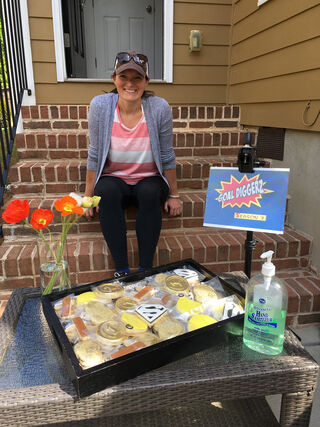Motivation
Look Back Before You Look Forward
The lessons I learned this year that will shape how I face next year.
Posted December 31, 2020
I study motivation and goals for a living. I’m all about goals, planning, resolutions, and looking forward, so there’s a lot I could say at this time of year.
But this week, I’ve been resonating about the need to look back. Sometimes we avoid reflecting on our past mistakes because we don’t want to feel guilt or other negative emotions. But those negative emotions are natural indicators of things that we need to address. Models of goal pursuit and motivation convene around the idea that negative emotions can be information about how who we are in a moment is different from who we want to be. This information can then drive us to make changes in our goals (i.e., we can change who we want to be), or we can make changes in our behaviors (i.e., we can change our current self).
Today I’m going to share three moments for me that defined my word of 2020. Not the word I thought it would have been, but the one it ended up taking on. As I move into 2021, I want to take a few moments to sit in the good (and bad) of these lessons so that I can take all my information with me.
The word that keeps coming back to me about 2020 is perspective.

Moment 1: It was mid-April. I had taken on a key administrative role in managing the largest international social/behavioral study of pandemic-related behaviors and reactions. At the same time, I was finishing up a semester of teaching that had transitioned from vibrant and in-person to online.
One of my classes was full of 24 seniors who had worked their tails off on an excellent class project (Season 3 of GoalDiggerzOfficial Podcast) and were having all of their graduation celebrations and typical senior activities canceled. I planned a drive-by pick-up of custom cookies designed to celebrate their work. And my sister-in-law was being admitted to the ICU with COVID-19.
We actually received the call she was being transferred at the exact moment a student was walking up to the cookie set-up. I sat dozens of feet away on my outdoor porch and chatted with him about his current situation, all while knowing what was happening on my husband’s phone call. The whole day was so surreal. I knew the moment it was happening that it would define my 2020, and I think it does for so much of us.
In that one day, I faced three different sides of COVID-19. And you have certainly experienced many other sides of it. Every moment has so many different meanings. We are all dealing with far more at one moment in time than we ever thought we could. No one is dealing with only the thing you are seeing.

Moment 2: We had been able to start hiking again once the parks reopened. On one trip, we traversed the Meigs Mountain Trail in Great Smoky Mountains National Park, and we came across a mesmerizing conjunction of creek and forest. These sorts of spaces are common in the Smokies, but something about this one captured us, and we spent several minutes photographing the area.
I came to one spot along the creek while my husband captured photos of me standing there. I stood at that creek feeling so big like I was taking over the space. When I saw the photo my husband had captured, I realized that, in fact, the only thing that was enormous was the smallness of myself in that space. The world I saw inside that moment was different than the world I saw outside of the moment. What we see and feel is both real and very much not real at the exact time.
Moment 3: I have had "being an ally for underrepresented groups and people in-the-margins" as a major goal for a long time. I work hard to help everyone feel welcome and included in my academic spaces, and I have celebrated our diversity as it has started to grow. There are brilliant scholars in my field who study prejudice and racism, and yet it was only this summer that I realized I had been leaning on defining racism as a personal trait because it allowed me to see myself as someone who was succeeding in minimizing racism in my life and in my sphere of influence.
I prided myself on mentees and the students in my life I knew I had supported. And then the thought occurred to me—what if Breonna Taylor had wanted to go back to school to get her Ph.D.? What if she had wanted to study self-control? What if she had wanted to work with me?
Suddenly, I realized that what is happening in other circles of influence is directly influencing the impact I am able to have in my own circle. The system of racism became obvious, and my perspective shifted to open up the ways I am working to combat broad injustices. It feels more personal because it exposes my own contributions to injustice, but it also feels more accurate to see that what I do in my space is insufficient.
These three moments share the biggest lesson I have learned this year—every moment is more complex than the way I see it. As I move into 2021, I want to remember this idea. To sit in a moment and know it is only one way of seeing, experiencing, and feeling. To hear someone’s story and not rush to put my twist on it.
2020 has given us all many things, and although many of those have been things we’d rather not have, writing off the challenges and ignoring the hard moments won’t teach us how to approach the next year (and beyond) in useful ways. I’m going to continue taking time to be thankful for new perspectives. I hope that you, too, can take some time today to reflect on the moments that taught you something in 2020 and put those moments to good use as you plan for 2021.
References
Carver, C. S., & Scheier, M. F. (1990). Origins and functions of positive and negative affect: a control-process view. Psychological review, 97(1), 19.
Buehler, R., Griffin, D., & Ross, M. (1994). Exploring the" planning fallacy": Why people underestimate their task completion times. Journal of personality and social psychology, 67(3), 366.
Ross, L., Greene, D., & House, P. (1977). The “false consensus effect”: An egocentric bias in social perception and attribution processes. Journal of experimental social psychology, 13(3), 279-301.
Salter, P. S., Adams, G., & Perez, M. J. (2018). Racism in the structure of everyday worlds: A cultural-psychological perspective. Current Directions in Psychological Science, 27(3), 150-155.




